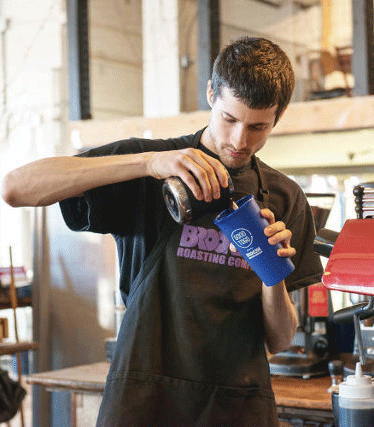Sustainability Column: Not OK-Cups

It’s easy to see how convenient Keurig machines are for the average college student vying for that extra ten minutes of sleep or studying. However, the waste associated with the K-cups goes largely unnoticed and that’s a problem. In the past few years, a large amount of attention has been drawn to the waste generated by Keurig K-cups, and many protests have sprung up in response to the unsustainable products. At the forefront of this movement is the “Kill the K Cup” campaign. If you haven’t seen the viral video, I strongly suggest you to check it out at KillTheKCup.org.
This recent backlash and attention to the matter has even spurred the creator of the Keurig machine, John Sylvan, to speak out about the unfolding disaster. According to a Buzzfeed article based off of an interview with The Atlantic, Sylvan regrets creating the device because of the waste associated with the single-use cups (which are not recyclable or biodegradable). In fact, it was calculated that if each pod that ended up in a landfill in 2014 was lined up, the Earth could be circled an estimated 10.5 times – maybe even more.
The vision Sylvan first had of the pod-based coffee machine was solely for offices, and now, almost one in three American homes is in possession of one, with many more similar pod-requiring appliances in the works (a Keurig for jello shots, Coca-Cola: “Keurig Cold,” Campbells: Keurig Soups). And although subsets of Keurig, such as Keurig Green Mountain, have announced their commitment to a fully recyclable version of a K-cup by 2020, Sylvan is skeptical of their success. Sylvan told The Atlantic “No matter what they say about recycling, those things will never be recyclable,” largely because of the requirements of the machine’s brewing process.
Until the manufacturers of the cups can address their wrongdoing, there are things that K-cup users can do to make a difference, and for some, Keurig is willing to assist you. In the “Grounds to Grow On” program, customers using Keurig machines at their offices are able to “collect each brewed pack and return it to our disposal partner.” Leftover grounds are collected for compost and used in a variety of agricultural applications, while the packs are given to Covanta Energy to gather energy from the waste. Additionally, some environmentally conscious K-Cup lovers have taken to creative and practical ways of reusing the cups. One nifty YouTube user even created a great tutorial on how to repack K-cups for her Keurig machine – using the plastic cups up to four or five times before sending them to the landfill and composting leftover coffee grounds!
Stay up to date with KillTheKCup.org if you want to learn more about current efforts to reduce waste and other sustainability issues regarding single-serve items. On campus, you can reduce waste by refilling your coffee mugs at places such as the Coop, Hieber Café or Frank.









